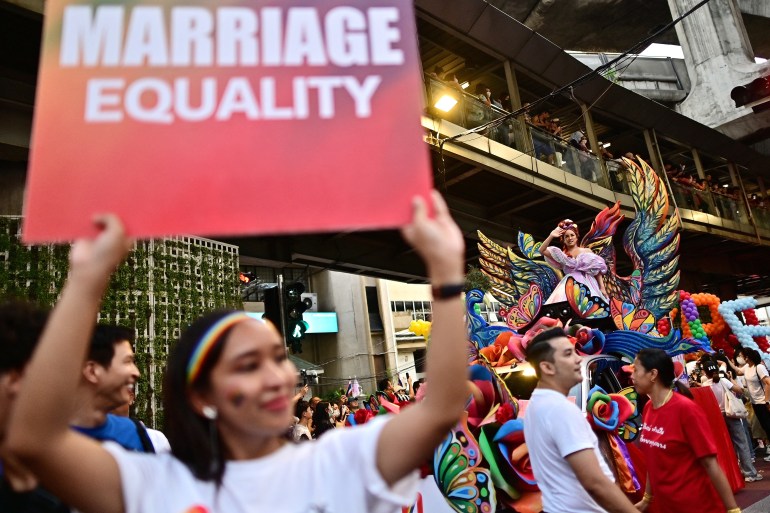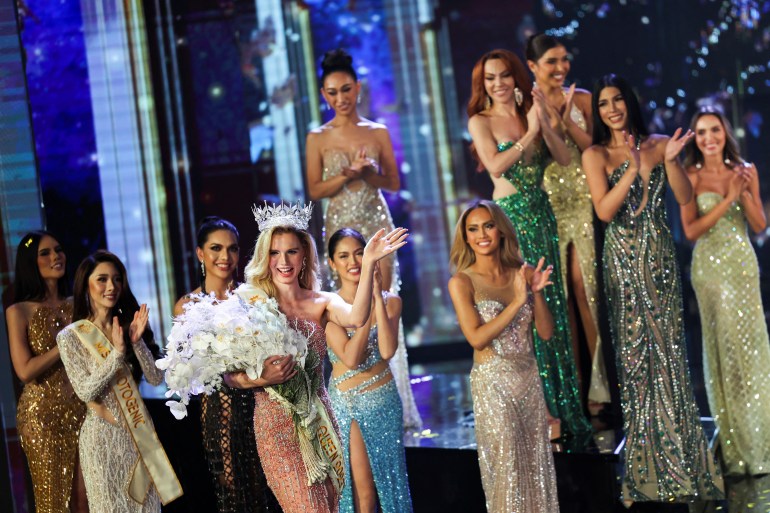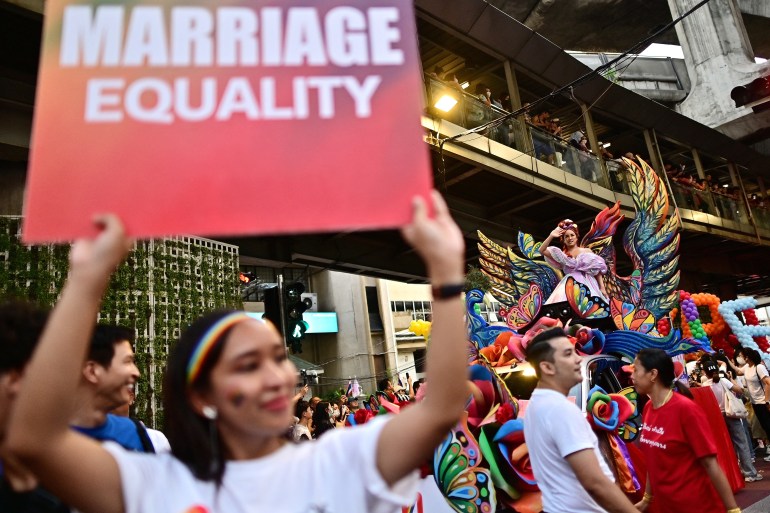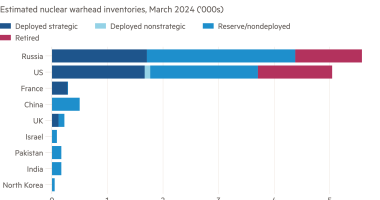Bangkok, Thailand – Thanadech Jandee is thrilled that Thailand’s marriage equality bill, allowing same-sex couples to marry, is moving closer to becoming law.
Thanadech, who was born biologically female and had gender reassignment surgery to identify as male last year, lives with his girlfriend and her son from a previous relationship.
“I want the equal marriage law to be passed. It will make my family complete like any other family of men and women,” the 34-year-old Grab delivery driver in Bangkok told Al Jazeera.
But along with many LGBTQ activists, Thanadech worries about the bill’s terminology.
Activists say using “parents” and “mother and father” in legal terms will affirm those who identify as LGBTQ on equal terms with other couples.
But efforts to get the wording into the bill have so far been unsuccessful.
The proposed marriage equality law will label marriage as a partnership between two individuals, instead of a man and a woman or a husband and a wife. Couples will have full rights, including receiving medical treatment, tax initiatives, inheritance rights and the right to adopt children.
“I just want to do whatever it takes to have rights that normal men and women have,” Thanadech said.
Thailand’s parliament moved closer to legalising same-sex marriage after the Senate approved the bill at its first hearing on Tuesday. The previous week, Thailand’s lower house approved the bill nearly unanimously – only 10 of the 415 sitting lawmakers did not vote in its favour.

The bill will be examined by the Senate vetting committee before two more readings, scheduled for July. The final step is for Thailand’s king to sign and approve it.
“It’s a cause for celebration,” Mookdapa Yangyuenpradorn, a Thailand human rights associate at Fortify Rights, told Al Jazeera.
“[But] it is important to ensure that the more inclusive and gender-neutral language “parents” is included in future revisions to prevent any discriminatory application of the Civil and Commercial Code. We remain steadfast in our call for full protection and recognition of LGBTI+ rights,” Mookdapa added.
In contrast to many other Asian countries, Thailand has long allowed for same-sex celebrations, including Pride. It also holds international transgender beauty pageants and is a global leader in gender reassignment surgery. In 2015, it passed the Gender Equality Act, aiming to protect all people from gender-based discrimination.
But despite having one of the most open LGBTQ communities in the Asian region, Thailand still provides no legal protection to transgender people.
Ariya Milintanapa was born biologically male but identifies as a trans woman. The 40-year-old is a parent to two boys with her husband Lee, whom she married in the United States in 2019. Ariya was the guardian for her younger brother and because of her birth gender as male, was allowed to adopt her now eight-year-old brother as his “uncle”. Their eldest son is a 10-year-old from her husband’s previous relationship.
She says the law makes it “difficult” for them to live as a family.
“It causes a lot of problems like travelling and insurance. We applied for one school but they kept asking for [legal proof] that we were “mum” and “dad”. Even bullies say [to our children] that their mum is different,” Ariya told Al Jazeera.
“We hope to hear the next move where the focus is mainly about the child’s benefit more than the concern of birth gender,” Ariya added.
Bullying risk
Without identifying same-sex and LGBTQ couples as “parents”, there could be a rise in discrimination and bullying between children, according to Nada Chaiyajit, a LGBTQ advocate and law lecturer at Mae Fah Luang University.
“If the law does not recognise “parents” status, it would potentially create discrimination in a form of social bullying,” Nada told Al Jazeera. “Your mother is not your real mother and is a f*****, something like that.”
Nada says it is unclear what other legal rights those who identify as LGBTQ will receive if they are not legally identified as parents and campaigners remain determined the term be described in the law.
“A lot of work is needed to be done. At least we still have some chances to work with the Senate to bring back the word “parents” to complete our rights to family establishment. We will keep pushing,” Nada added.

Emilie Palamy Pradichit, the founder of the Manushya Foundation, a human rights organisation in Bangkok, say the wording means the proposed law is not truly for marriage equality.
“It means only people of the same sex recognised as father or mothers will be allowed to marry, because it is a same-sex bill, not a truly marriage equality bill. For example, if a transgender woman wants to marry a non-binary person… they won’t be able to. Thailand does not have a legal gender identity law – that’s a core issue,” she told Al Jazeera.
That could change in the future though. According to one Thai MP, a draft gender recognition law is in the works.
“Draft gender recognition law… Intentional gender identity… I’m working on it. To allow people to define themselves in various ways to define their own gender. It is something that must be continuously pushed forward,” Tunyawaj Kamolwongwat, a lawmaker with the Move Forward Party posted on the X platform.
For now, Thailand’s focus remains on the marriage equality bill.
It has taken more than a decade of campaigning to get to this point and the draft legislation holds widespread political support. Prime Minister Srettha Thavisin, who became leader after elections last year has championed it.
“It is considered the pride of Thai society that together [we] walk towards a society of equality and respect diversity,” the Thai Prime Minister wrote on Twitter, formerly X, last week.
If the bill does become law, Thailand will become the first country in Southeast Asia to legalise same-sex marriage – and the third in the wider Asian region after Taiwan and Nepal.
Thailand has a population of more than 71 million people and market research firm Ipsos Group says about 9 percent of Thai people identify as LGBTQ.
Since the first reading of the law in December, enquiries about wedding ceremonies by the community have surged.
“There’s definitely an increase of interest. So that would be about like 25 percent of all the bookings. A lot of couples are looking to celebrate,” Wannida Kasiwong, the owner of Wonders and Weddings in Thailand, told Al Jazeera earlier this year.
Read More: World News | Entertainment News | Celeb News
Al Jazeera









